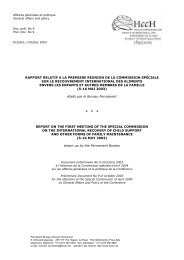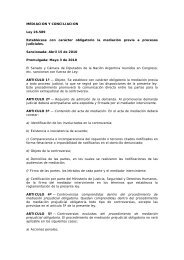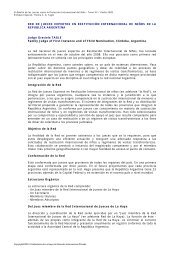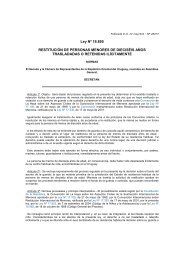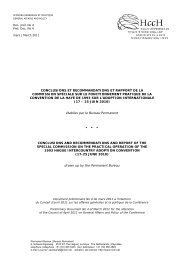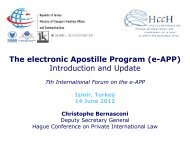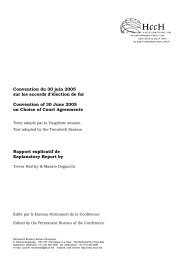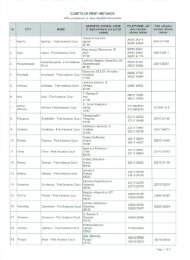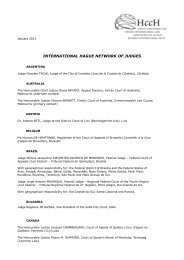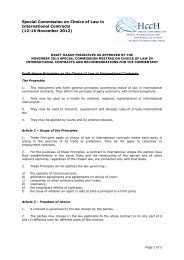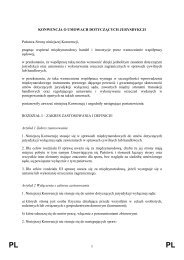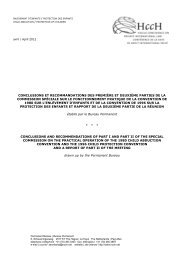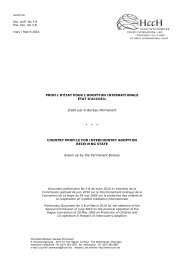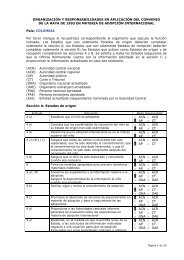aperçu des réponses au questionnaire accompagnant la ... - HCCH
aperçu des réponses au questionnaire accompagnant la ... - HCCH
aperçu des réponses au questionnaire accompagnant la ... - HCCH
Create successful ePaper yourself
Turn your PDF publications into a flip-book with our unique Google optimized e-Paper software.
Question Réponse / Reply État / State<br />
6.4. Exclusive<br />
character of the Conv. –<br />
any development?<br />
country, the service itself was already performed domestically and the addressee is then only notified informally of<br />
the domestic service. German <strong>la</strong>w does also provide for situations of this kind under section 184 of the German Code<br />
of Civil Procedure (service by mail), although not specifically for the writ of summons, but rather for the final<br />
judgment.<br />
This refers instead to cases in which service abroad is effected, factually at least, also under the <strong>la</strong>w of the country<br />
where the court has venue, but not on the basis of the Hague Convention on the Service of Documents.<br />
Particu<strong>la</strong>rly in re<strong>la</strong>tions with the United States of America, for instance, defendant industries have<br />
reported that only a portion of services abroad are performed on the basis of the Hague Convention on<br />
the Service of Documents and that consequently, in practice, the priority accorded to the Convention<br />
under Rule 4 f) of the Federal Rules of Civil Procedure is not always observed. Instead, service is performed<br />
– partly in addition to service in accordance with the Convention and simultaneously with it – on subsidiaries located<br />
in the USA and the effects of service are extended to the defendant foreign parent company. In addition, Rule 4 d)<br />
of the Federal Rules of Civil Procedure endorses the waiving of service that is performed on the basis of<br />
international treaties, whereas it ensures the defendant a longer period of time in which to file statements, but at<br />
the same time possibly (in domestic service) charges the defendant for all costs connected with the service.<br />
Ultimately, cases of service by mail to Germany frequently occur, although Germany objected to this<br />
form of service on the basis of the Hague Convention on the Service of Documents.<br />
A further problem exists in the practical incapacity to effect service on U.S. soldiers who are stationed in a third<br />
State. Service under the Convention is repeatedly refused by U.S. <strong>au</strong>thorities whilst making reference to the<br />
necessity of performing service via the third State in which the respective soldier is stationed. However, the third<br />
State then refuses service, since the U.S. soldiers stationed there do not fall under their jurisdiction. As a result,<br />
service cannot be effected.<br />
There is little controversy that the Hague Service Convention's procedures are generally considered mandatory<br />
and exclusive when litigants must make service outside of the United States. As addressed by the U.S. Supreme<br />
Court in Volkswagenverk A.G. v. Schlunk, 486 U.S. 694 (1988), however, there is a narrow exception where service<br />
can be made on persons or entities within the United States pursuant to procedures under specific local <strong>la</strong>w.<br />
Although that <strong>la</strong>w is binding on all state and federal courts within the United States, and service under local rules<br />
may be utilized when avai<strong>la</strong>ble under applicable local <strong>la</strong>w, most outgoing service of process requests continue to be<br />
made under the Hague Convention.<br />
No / Non<br />
[F] Comme indiqué dans le manuel provisoire, <strong>la</strong> Cour d'appel a récemment indiqué que <strong>la</strong> Convention n'est pas<br />
exclusive (voir page 16 du Manuel).<br />
[E] As mentioned in the provisional manual, the Court of Appeal has recently indicated that the Convention is not<br />
exclusive (see page 16 of Manual).<br />
The Slovak <strong>au</strong>thorities have always accepted this aspect. We have, however, encountered a repeated disregard<br />
for this kind of interpretation by the German courts in re<strong>la</strong>tion to Slovak parties to the proceedings. The German<br />
Etats-Unis<br />
Allemagne, Bé<strong>la</strong>rus,<br />
Bulgarie (depuis 2000),<br />
Canada (IPE, Alberta),<br />
Chine (Macao),<br />
Espagne, Fin<strong>la</strong>nde,<br />
France, Italie, Japon,<br />
Luxembourg, Norvège,<br />
Pays-Bas (voir rép.<br />
complète), Portugal,<br />
Suisse<br />
Canada (Québec)<br />
Rép. Slovaque<br />
Page 12 of 69



